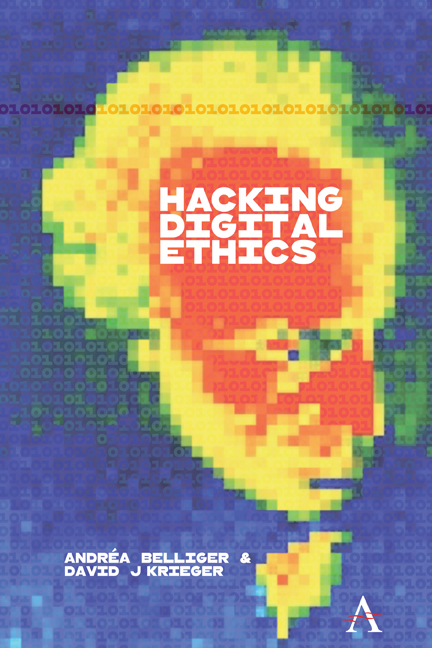Series Editors’ Introduction
Published online by Cambridge University Press: 06 April 2021
Summary
As lead editors, we are excited to write this introduction to Belliger and Krieger's Hacking Digital Ethics, the second authored volume in the Anthem Press Ethics of Personal Data Collection Series. We appreciate ongoing cooperation with the acquisitions editor Megan Greiving, whose initial communication with Colette inspired our cooperation after speaking with the publisher Tej P. S. Sood.
The series builds on a special issue of Genocide Studies and Prevention organized by Colette at the invitation of Professor Douglas S. Irvin-Erickson, School for Conflict Analysis and Resolution, George Mason University, Virginia, and Yasemin Irwin-Erickson, with funding for workshops at New York University provided by a grant from the Robert Bosch Foundation in Stuttgart, Germany. We are most grateful to Carolin Wattenberg, senior manager to the board of management, and Dr. Stella Voutta, program director, at the Bosch Foundation, as well as Anda Catharina Ruf, advisor for private foundations and philanthropy, Deutsche Gesellschaft für Internationale Zusammenarbeit (GIZ) GmbH (German Corporation for International Cooperation GmbH), for their helpful and timely assistance in Germany.
Belliger and Krieger have been at the bleeding edge of thought on ethics and technology for the past few decades. Our earliest memory relative to this series was Belliger's publication On Networking: A Hermeneutics for the Digital Age (2012). Our aim is to explore the ethics of personal data collection because we identify personal data as the most microscopic measure of our information state. More specifically, we understand data as the new matter. Our expectation is for a data point to be identifiable with every piece of physical matter. Via data we are identifying the essence of what we are. In their exploration of network theory during the 2010 decade, Belliger and Krieger had to examine the methodological interpretation of philosophical texts like those of ancient religions, including the Abrahamic beliefs.
James recalls becoming familiar with our coauthors after giving a talk at the Transhumanism and Spirituality Conference in 2010, sponsored by the Mormon Transhumanist Association at the University of Utah's Marriott Library. After a presentation titled “Integrationalism: Spiritual Disincentives for Humanity,” James was approached by Common Ground Publishing to expand his paper into a book (published in 2012) and was directed to Belliger's paper.
- Type
- Chapter
- Information
- Hacking Digital Ethics , pp. vii - xPublisher: Anthem PressPrint publication year: 2021



